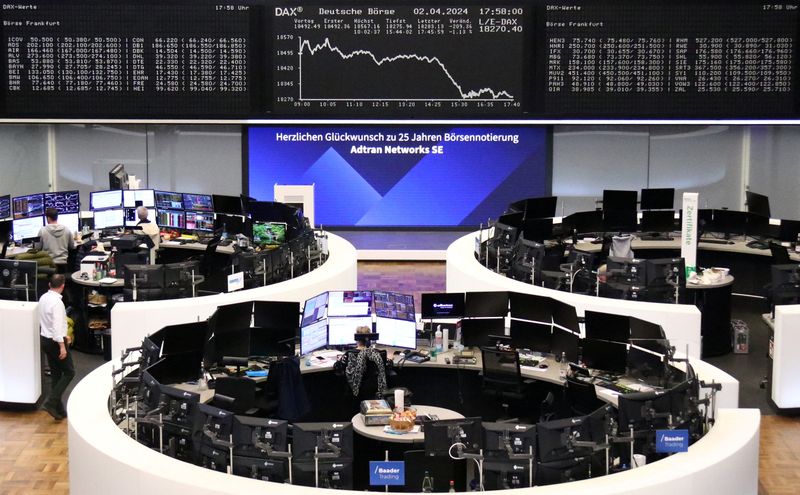Japan's benchmark Nikkei average (.N225), opens new tab closed 12.40% lower at 31,458.42, its largest one-day fall since October 1987, while the broader Topix (.TOPX), opens new tab lost 12.48% to 2,220.91.
European shares fell to near six-month lows amid a global selloff in equities on fears of a slowdown in U.S. economic growth, with only a handful of stocks trading in the green. The pan-European STOXX 600 index (.STOXX), opens new tab was down 2.6% at 487.15 points, its lowest since Feb. 13.
The Euro STOXX volatility index (.V2TX), opens new tab jumped 5.7 points to 30.26, its highest since March 2023. Germany's DAX (.GDAXI), opens new tab, France's CAC 40 (.FCHI), opens new tab, Britain's FTSE (.FTSE), opens new tab and Spain's IBEX 35 (.IBEX), opens new tab all fell more than 2%. Treasury bonds were in demand, with U.S. 10-year yields hitting at one point 3.723%, the lowest since mid-2023. A worryingly weak July payrolls report on Friday saw markets price in a 78% chance the Federal Reserve will not only cut rates in September, but ease by a full 50 basis points. Futures imply 122 basis points of cuts in the 5.25-5.5% funds rate this year, and rates of around 3.0% by the end of 2025.
"Signs of emerging weakness in the U.S. economy are evident, with negative indicators from hiring, retail sales, and PMI reports," said Bruno Schneller, managing partner at Erlen Capital Management.
Schneller noted, however, that economic data like GDP and trade remained stable while the prospect of autumn U.S. rate cuts approached. Analysts at Goldman Sachs (GS.N), opens new tab also noted the Fed's ability to re-instil market optimism, estimating a 25% likelihood of a U.S. recession. Analysts at JPMorgan were even more bearish, assigning a 50% probability to a recession.
Item 1 of 2 The German share price index DAX graph is pictured at the stock exchange in Frankfurt, Germany, August 5, 2024. REUTERS/Staff [1/2]The German share price index DAX graph is pictured at the stock exchange in Frankfurt, Germany, August 5, 2024. REUTERS/Staff Purchase Licensing Rights, opens new tab
Now that the Fed looks to be materially behind the curve, we expect a 50 bp cut at the September meeting, followed by another 50 bp cut in November," said economist Michael Feroli. "Indeed, a case could be made for an inter-meeting easing, especially if the data soften further."
Investors will get a read on employment in the service sector from the ISM non-manufacturing survey later on Monday and analysts are expecting a rebound to 51.0 after June's unexpected slide to 48.8. This week has earnings from industrial bellwether Caterpillar (CAT.N), opens new tab and media giant Walt Disney (DIS.N), opens new tab, which will give more insight into the state of the consumer and manufacturing. Also reporting are healthcare heavyweights such as weight-loss drugmaker Eli Lilly (LLY.N), opens new tab. The huge drop in Treasury yields had also overshadowed the U.S. dollar's usual safe-haven appeal and dragged the greenback down 0.5% against a basket of other major currencies.
The dollar fell by as much as 3.28% against the Japanese yen to 141.675 , while the euro dived 2.65% to 155.63 . The single currency rose against the dollar to $1.0945 . The Swiss franc was a major beneficiary of the rush from risk, with the dollar falling around 1% and hovering at six-month lows of 0.8500 francs "The shift in expected interest rate differentials against the U.S. has outweighed the deterioration in risk sentiment," said Jonas Goltermann, deputy chief markets economist at Capital Economics. "If the recession narrative takes hold in earnest, we would expect that to change, and the dollar to rebound as safe-haven demand becomes the dominant driver in currency markets."
Investors have also increased wagers other major central banks will ease more aggressively, with the European Central Bank now seen cutting by 67 basis points by Christmas.
In commodity markets, gold lost some of its safe haven appeal, around 1% at $2,419 an ounce . Oil prices eased as concerns about global energy demand offset worries about the potential impact to supply from a widening conflict in the Middle East.










